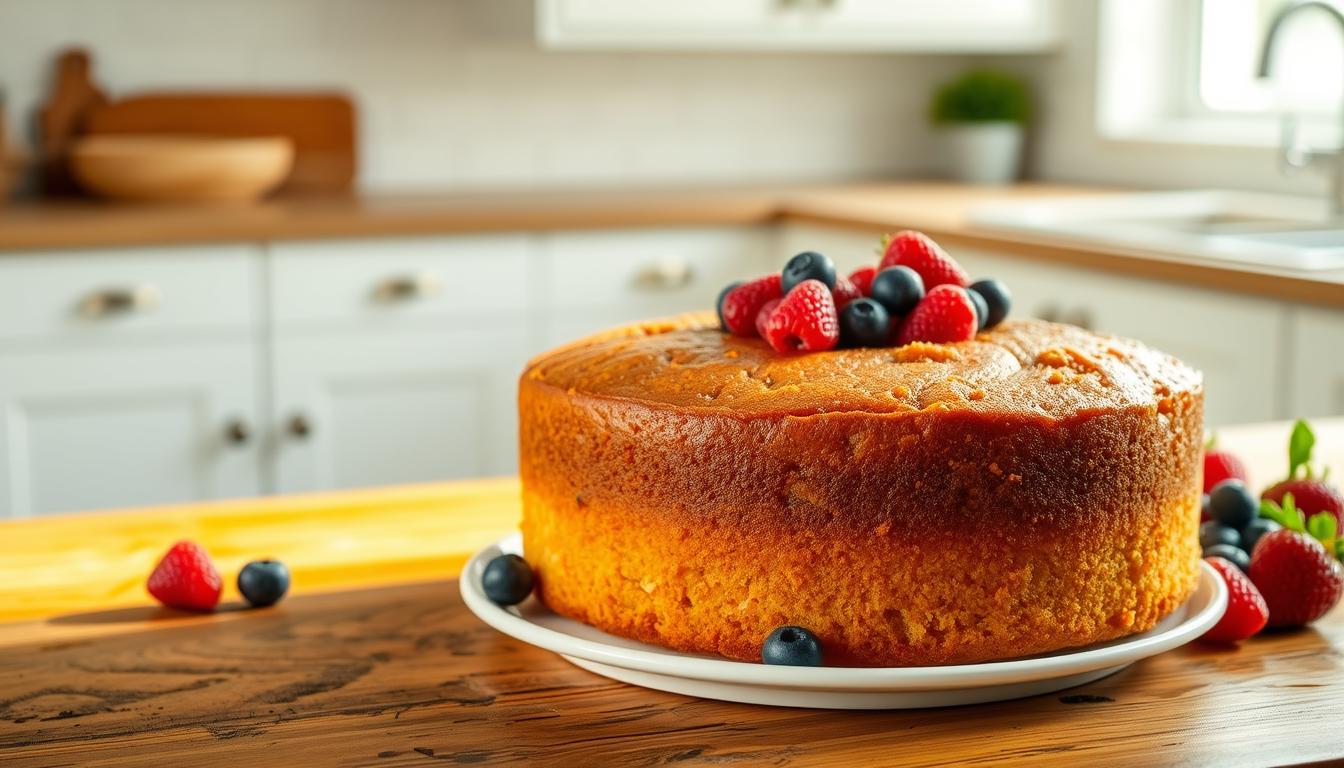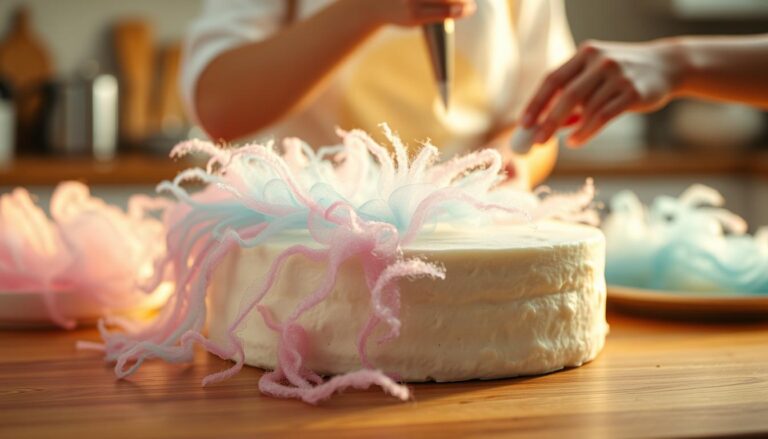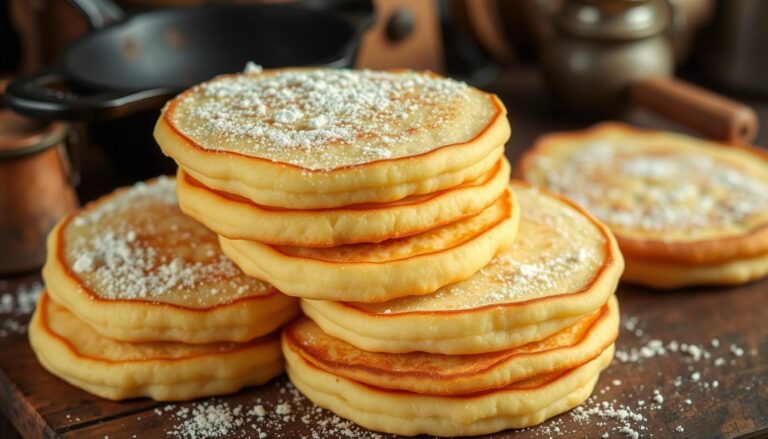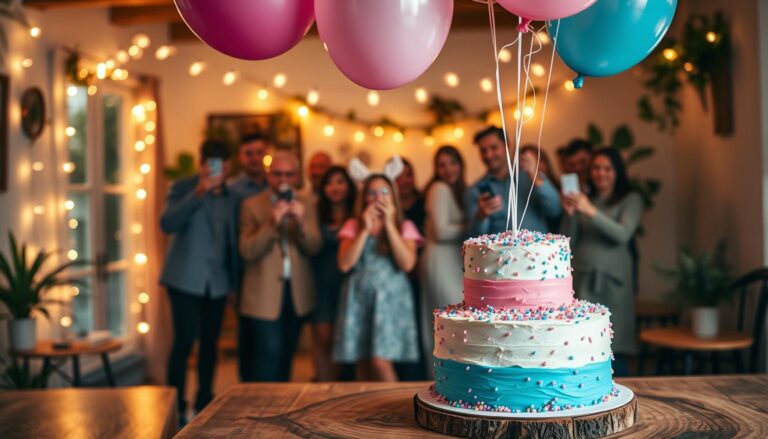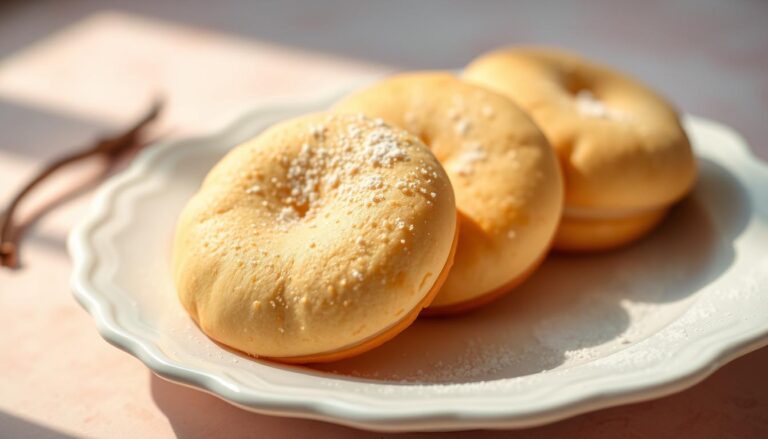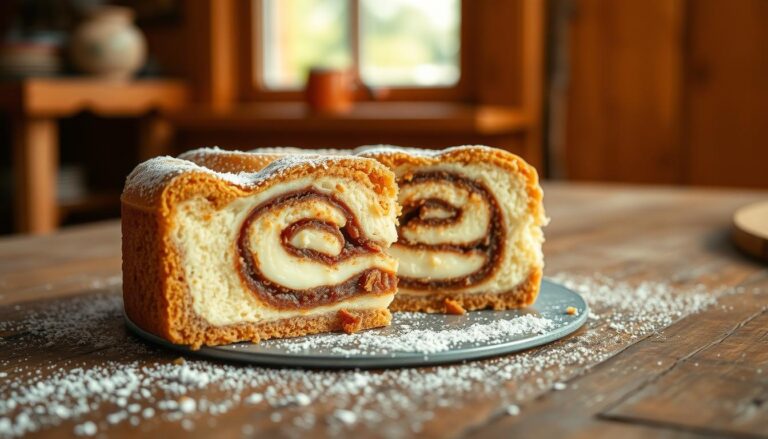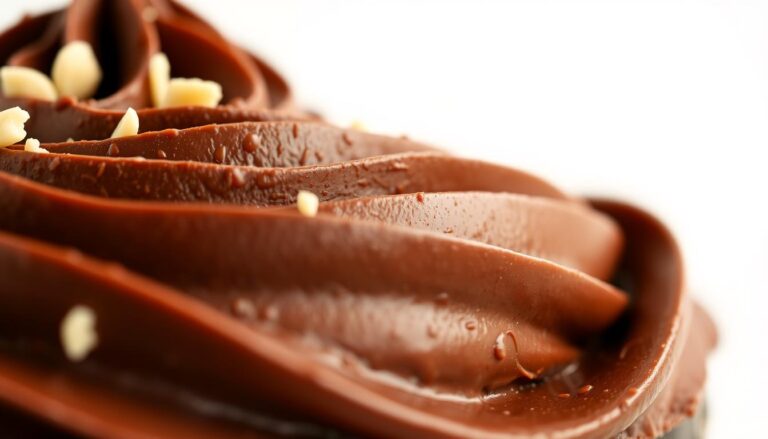How to Make the Perfect Buttermilk Cake Recipe
Every baker has that moment when they find a recipe that makes their kitchen magical. For me, it was the buttermilk cake recipe. The first time I took it out of the oven, I knew it was special.
A buttermilk cake is more than just a dessert. It’s a culinary journey that turns simple ingredients into something amazing. Its tender crumb and rich taste will make your baking skills shine and impress everyone who tries it.
Whether you’re new to baking or have years of experience, this recipe will help you make a cake that’s moist, flavorful, and hard to resist. Get ready to turn your kitchen into a bakery with our ultimate buttermilk cake recipe.
Table of Contents
Understanding the Magic of Buttermilk in Baking
Explore the world of desserts with buttermilk and discover its scientific magic. Buttermilk is more than just an ingredient. It’s a baking superhero that turns ordinary cakes into extraordinary treats.
Buttermilk adds a unique chemistry to your baking. It’s not just about adding moisture. Its acidic nature creates amazing texture and flavor that bakers love.
Chemical Reaction with Leavening Agents
When buttermilk meets baking soda, something magical happens. The acid in buttermilk triggers a reaction that makes your cake rise beautifully. This interaction leads to:
- Lighter, fluffier cake texture
- Increased volume in baked goods
- More uniform crumb structure
“Buttermilk is the secret weapon of professional bakers, turning ordinary recipes into extraordinary creations.” – Baking Professionals Quarterly
Moisture and Texture Benefits
One cup of buttermilk can make a big difference in your baked goods. It adds moisture that makes your desserts incredibly soft and tasty. The protein in buttermilk also creates a rich, smooth texture that’s a joy to eat.
Flavor Enhancement Properties
Buttermilk does more than just add moisture. It also adds a subtle tanginess that balances sweetness. This unique flavor makes your desserts unforgettable. The slight acidity cuts through richness, creating a more complex taste.
Understanding buttermilk’s role is crucial for mastering baking. Its many properties make it essential for creating amazing desserts.
Essential Ingredients for Buttermilk Cake Recipe
Making delicious cakes with buttermilk recipes needs the right ingredients. Each part plays a key role in making the cake moist and tasty. Knowing what each ingredient does helps you make the perfect cake every time.
Your cake starts with choosing the right ingredients. The best ingredients make your cake taste great and feel right.
- All-Purpose Flour: Gives your cake its shape
- Granulated Sugar: Adds sweetness and helps with caramelization
- Vegetable Oil: Keeps the cake moist
- Buttermilk: Makes the cake tender and slightly tangy
The quality of your ingredients affects your cake’s taste and texture. Using fresh, room-temperature ingredients helps mix better and makes a batter that’s consistent.
| Ingredient | Quantity | Purpose |
|---|---|---|
| All-Purpose Flour | 1 ½ cups | Structural base of cake |
| Granulated Sugar | 1 cup | Sweetness and texture |
| Vegetable Oil | ½ cup | Moisture retention |
| Whole Buttermilk | ½ cup | Tenderness and flavor |
When baking with buttermilk, being precise is key. Measuring ingredients correctly leads to consistent results every time you bake.
Kitchen Tools and Equipment Needed
Baking a delicious cake with buttermilk needs the right tools and equipment. The success of your cake depends on the ingredients and the right kitchen gear. Choosing the right tools makes baking smoother and more fun.
Baking Pans and Sizes
Choosing the right baking pan is key for your buttermilk cake. Different sizes and materials affect the cake’s texture and baking time.
- 9-inch round cake pans
- Springform pans
- Bundt cake pans
- Rectangular 9×13 inch baking pans
Essential Mixing Equipment
Good mixing equipment is vital for a smooth buttermilk cake batter. Each tool has a special role in making the perfect cake.
| Equipment | Purpose |
|---|---|
| Stand Mixer | Efficiently mix ingredients with consistent speed |
| Hand Mixer | Versatile for smaller batches and quick mixing |
| Whisk | Incorporate air and blend dry ingredients |
| Rubber Spatula | Scrape bowl sides and fold ingredients gently |
Precision Measuring Tools
Accurate measurements are crucial for a successful cake. Invest in quality measuring tools for recipe precision.
- Measuring cups (dry and liquid)
- Measuring spoons
- Digital kitchen scale for precise ingredient weighing
With these essential tools, you’ll be ready to make a delicious buttermilk cake. It will impress your family and friends.
Proper Ingredient Temperature and Preparation
Creating the perfect buttermilk cake recipe starts with understanding ingredient temperatures. Room temperature ingredients are key for a smooth batter. This results in a tender cake with great texture.
Here’s why ingredient temperature matters in your buttermilk cake recipe:
- Cold ingredients can create uneven mixing
- Room temperature ingredients blend more smoothly
- Proper temperature helps prevent over-mixing
For optimal results, remove key ingredients from the refrigerator about 30-45 minutes before baking. Focus on bringing these items to room temperature:
- Eggs: Allow 30 minutes to warm up
- Butter: Soft but not melted
- Buttermilk: Remove from refrigerator in advance
Measuring ingredients accurately is equally important for your buttermilk cake recipe. Use the following techniques to ensure precision:
- Fluff flour before measuring
- Use level measuring cups
- Avoid compacting dry ingredients
Pro tip: For buttermilk, if you don’t have it on hand, create a quick substitute. Add 1 tablespoon of vinegar to 1 cup of milk. Let it sit for 5-10 minutes before using in your recipe.
Step-by-Step Mixing Technique
Making the perfect vanilla cake with buttermilk needs precision and care. The right mixing technique makes the cake tender and flavorful. It will surely impress your loved ones.
Combining Dry Ingredients
Begin by carefully preparing your dry ingredients. In a big mixing bowl, sift together:
- 3 1/3 cups all-purpose flour
- 3/4 teaspoon kosher salt
- 3/4 teaspoon baking soda
- 1 1/4 cups granulated sugar
Wet Ingredient Integration
For a smooth vanilla cake, follow these steps:
- Make sure all ingredients are at room temperature
- Use 2 1/4 cups whole buttermilk
- Add 3 large eggs
- Incorporate 1 teaspoon vanilla extract
Achieving Proper Batter Consistency
The secret to a perfect vanilla cake is batter consistency. Mix gently to avoid overmixing. Your batter should be smooth, without lumps, and slightly thick.
| Mixing Stage | Key Technique | Duration |
|---|---|---|
| Dry Ingredients | Sift thoroughly | 2-3 minutes |
| Wet Ingredients | Mix on low speed | 1-2 minutes |
| Final Mixing | Fold gently until combined | 30-45 seconds |
Pro tip: Stop mixing as soon as ingredients are just combined to prevent a tough cake texture.
Baking Temperature and Timing Guidelines
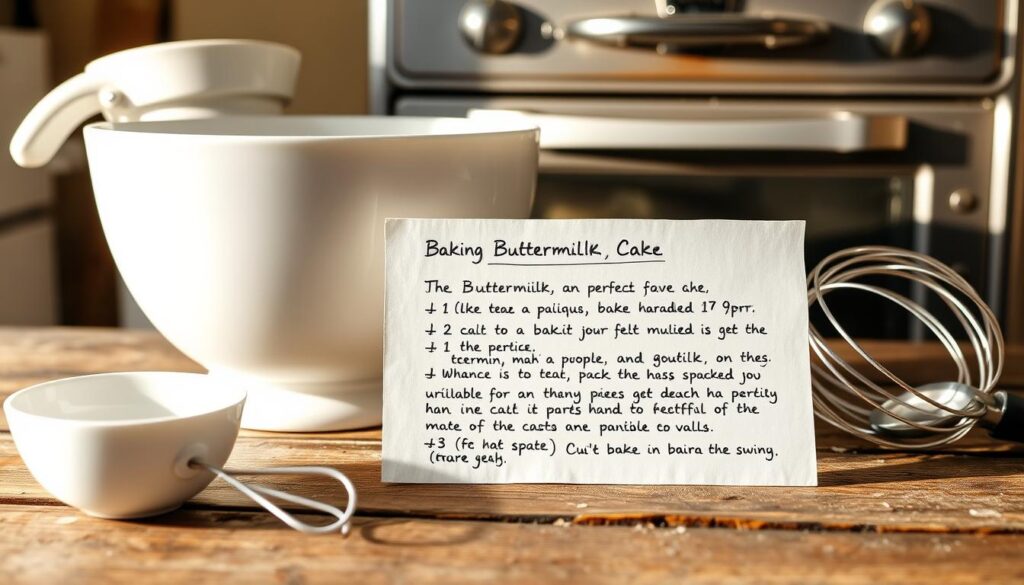
Getting the right baking temperature is key for buttermilk cakes. Most buttermilk cakes do best at 350°F. This temperature ensures even heat and a lovely golden-brown look.
The baking time varies, usually between 30-40 minutes. Bakers suggest checking your cake at these points for perfection:
- Visual golden-brown edges
- Toothpick test for doneness
- Consistent oven temperature
It’s important to know your oven’s quirks when baking buttermilk cakes. An oven thermometer can check the actual temperature. Many home ovens might not be exactly right.
| Baking Parameter | Recommended Setting |
|---|---|
| Oven Temperature | 350°F |
| Baking Time | 30-40 minutes |
| Doneness Indicator | Clean toothpick test |
Pro tip: Always preheat your oven fully before baking. This ensures even heat and a tender crumb. Buttermilk cakes are famous for this texture.
Remember, things like pan type, cake size, and oven differences can affect baking time. Watch your cake closely in the last 10 minutes to avoid over-browning.
Creating the Perfect Vanilla Buttercream Frosting
Elevate your desserts with buttermilk by mastering the art of vanilla buttercream frosting. This luxurious topping turns simple cakes into extraordinary culinary experiences. It adds richness and sophistication to your baking.
Essential Frosting Ingredients
Crafting the perfect buttercream requires premium ingredients. Your base components will include:
- 1 cup (226g) unsalted butter, softened
- 4-5 cups (480-600g) confectioners’ sugar
- 1/4 cup (60ml) heavy cream
- 2 teaspoons pure vanilla extract
- 1/8 teaspoon salt
Professional Mixing Techniques
Achieving smooth, creamy buttercream demands precision. Follow these expert mixing steps:
- Beat butter for 2 minutes on medium speed
- Gradually incorporate sugar on low speed
- Whip on medium-high for an additional 2 minutes
- Adjust consistency as needed
Masterful Application Methods
Your buttercream can cover 12-16 cupcakes or create a thin layer on a quarter sheet cake. Pro tip: Use an offset spatula for smooth spreading or piping bags for decorative designs.
“The secret to perfect buttercream is patience and quality ingredients.” – Professional Pastry Chef
| Storage Method | Duration |
|---|---|
| Room Temperature | Up to 3 days |
| Refrigerated | Up to 1 week |
| Frozen | Up to 3 months |
Remember, your buttercream is the crowning glory of desserts with buttermilk. Take your time, use premium ingredients, and let your creativity shine!
Storage and Serving Recommendations
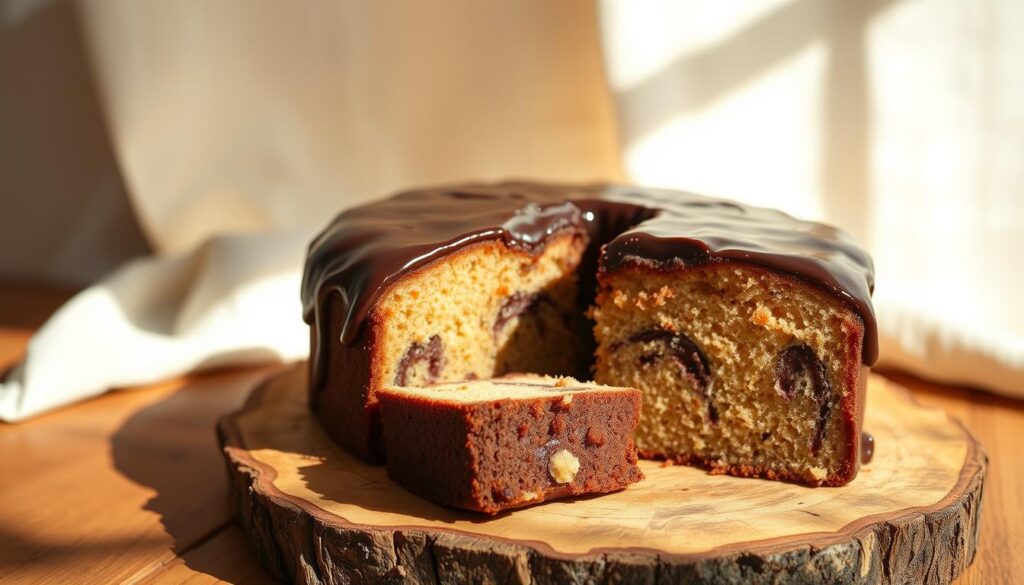
Your delicious buttermilk chocolate cake needs the right care to keep its amazing taste and texture. After baking with so much effort, storing the cake right ensures everyone enjoys it fully.
Cake Storage Guidelines
Here are the best ways to keep your buttermilk chocolate cake fresh:
- Room Temperature Storage: Keep the frosted cake covered at room temperature for 3-4 days
- Refrigerator Storage: Store for up to 1 week, knowing the frosting will get firmer when chilled
- Freezing Option: Wrap unfrosted cake layers tightly for up to 2 months
Serving Suggestions
Here are some great ways to serve your buttermilk chocolate cake:
- Pair with vanilla ice cream for a classic dessert experience
- Serve alongside fresh berries to enhance the cake’s richness
- Enjoy with a hot cup of coffee or tea
Temperature Recommendations
| Cake Type | Recommended Temperature | Storage Duration |
|---|---|---|
| Frosted Buttermilk Cake | Room Temperature | 3-4 days |
| Refrigerated Cake | Chilled | Up to 1 week |
| Frozen Cake Layers | Freezer | Up to 2 months |
Pro tip: Always bring refrigerated buttermilk chocolate cake to room temperature before serving to restore its original moisture and flavor profile.
Troubleshooting Common Baking Issues
Baking a perfect cake with buttermilk can be tricky. Knowing common problems helps make a moist cake every time.
Common Cake Texture Problems
Dry or dense cakes are common issues. They often come from wrong flour measurements. It’s best to weigh ingredients for accuracy.
- Too much flour makes cakes crumbly and dry
- Overbaking causes moisture loss
- Wrong leavening agent amounts affect rise
Flour and Moisture Challenges
Finding the right flour and liquid balance is key. All-purpose flour has 10-12% protein, making cakes denser. Cake flour, with 7-8% protein, helps make cakes lighter.
| Flour Type | Protein Content | Cake Texture Impact |
|---|---|---|
| All-Purpose Flour | 10-12% | Denser texture |
| Cake Flour | 7-8% | Lighter, softer crumb |
Quick Fixes for Dry Cakes
If your cake is dry, don’t worry. A simple cake soak can rescue your dessert. Use simple syrup or a matching liquid to add moisture.
“Baking is a science, but rescue is an art.” – Anonymous Baker
Buttermilk Substitution Tip
Need buttermilk? Mix ½ cup whole milk with a tablespoon of lemon juice or vinegar. Wait 5 minutes for it to curdle. It’s the perfect acidic base for your cake.
Conclusion
Your buttermilk cake recipe is more than just a dessert—it’s a canvas for culinary creativity. It’s perfect for birthday celebrations or casual family gatherings. This versatile recipe offers a delightful treat that everyone will love.
The magic lies in understanding each ingredient’s role and mastering the baking techniques shared throughout this guide. Every slice of this buttermilk cake represents a perfect balance of moisture, flavor, and texture.
Whether you stick to the classic vanilla version or experiment with additions like nuts or citrus zest, you’ll discover a world of baking possibilities. Remember that precision in measuring, careful mixing, and proper baking temperature are key to achieving a consistently delicious result.
Start baking with confidence, knowing you now have a reliable buttermilk cake recipe that can be adapted to suit different occasions and personal tastes. Invite friends and family to share in your baking adventure, and don’t be afraid to put your unique spin on this timeless classic.
Your kitchen is now equipped with the knowledge to create a memorable dessert that will become a cherished family favorite. We invite you to share your baking experiences, variations, and personal touches. Every baker’s journey is unique, and your interpretation of this buttermilk cake recipe could inspire others to explore the joy of home baking.

